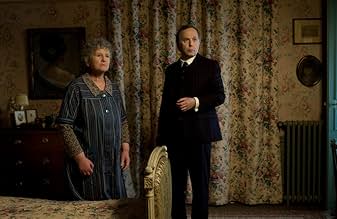Les femmes du 6e étage
- 2010
- Tous publics
- 1h 44min
NOTE IMDb
7,1/10
11 k
MA NOTE
Dans le Paris des années 60, la vie d'un couple conservateur est bouleversée par un groupe de servantes espagnoles vivant dans le même bâtiment.Dans le Paris des années 60, la vie d'un couple conservateur est bouleversée par un groupe de servantes espagnoles vivant dans le même bâtiment.Dans le Paris des années 60, la vie d'un couple conservateur est bouleversée par un groupe de servantes espagnoles vivant dans le même bâtiment.
- Réalisation
- Scénario
- Casting principal
- Récompenses
- 2 victoires et 3 nominations au total
Avis à la une
Thank goodness I got tired of the trash that Hollywood tips out like churned mince through a mincer and decided to begin watching foreign films!
French movies, in particular, seem to have a knack for producing a love story that doesn't leave me puking with either boredom or the sheer stupidity and bad acting.
This is one such little gem. Delightful, understated, charming. When a Spanish maid moves to France she takes a job with a wealthy businessman and his detached wife. As the wife listens more and more to her malicious, gossipy society friends, she becomes suspicious of her husband having an affair.
Her husband certainly is up to many things, but he's a lovely man, played delightfully, and he's falling in love alright... with a whole new way of life.
I enjoyed every minute of this!
French movies, in particular, seem to have a knack for producing a love story that doesn't leave me puking with either boredom or the sheer stupidity and bad acting.
This is one such little gem. Delightful, understated, charming. When a Spanish maid moves to France she takes a job with a wealthy businessman and his detached wife. As the wife listens more and more to her malicious, gossipy society friends, she becomes suspicious of her husband having an affair.
Her husband certainly is up to many things, but he's a lovely man, played delightfully, and he's falling in love alright... with a whole new way of life.
I enjoyed every minute of this!
THE WOMEN ON THE 6TH FLOOR (Les femmes du 6ème étage) is a delightful bit of French pastiche that entertains while it also provides insight into several problems - immigration, class distinction, rich controlling poor, and the polar extremes of between the wealth and the working class. Fortunately the story as written by Jérôme Tonnerre and writer/director Philippe Le Guay takes place in the 1960s, offering the audience to glance back at period when social reforms were in the gestational phase and in doing so the film allows the comedy to reign - a fact that makes the reality eventually more poignant.
The story takes place in Paris in 1963 in an elegant neighborhood where Jean-Louis Joubert (Fabrice Luchini) is a serious but uptight stockbroker, married to Suzanne (Sandrine Kiberlain), a starchy class-conscious woman and father of two arrogant teenage boys, (Camille Gigot and Jean-Charles Deval) currently in a boarding school. Jean-Louis lives a steady yet boring life while Suanne busies herself with luncheon appointments, hair appointments, charities, etc. Jean-Louis' mother had been living with the Jouberts until her recent death and now Suzanne forces Jean-Louis to move all of the deceased woman's things to the attic on the 6th floor, an act that infuriates the longtime French maid Germaine (Michèle Gleizer) who leaves the household in disgust. Naturally everything deteriorates an Suzanne must find a new maid. She encounters Maria (Natalia Verbeke) recently immigrated from Spain, offers her a trial employment, and Maria, who becomes friends with the group of maids who live in the disgusting squalor of the 6th floor of the building: naturally these Spanish maids bond and help Maria bring the Joubert household to a state of perfection. Jean-Lois is thrilled with the new maid and discovers the other maids, hears their problems with the sewer and other poor conditions, and sets out to befriend these wonderful ladies who are living in his building : the redoubtable Carmen Maura, Lola Dueñas, Berta Ojea, Nuria Solé, and Concha Galán. These lovely and deeply appreciative lively Spanish maids help Jean- Louis to become open to a new civilization and a new approach of life. In their company - and especially in the company of beautiful Maria - Jean-Louis will gradually become another man, a better man.
The acting is first rate, the subplots embroider the main story with fine finesse, and the sense of the transformation of one wealthy but emotionally vapid man into the loving charmer he becomes makes for a very fine comedy. The ending (three years later) is a bit vapid and cheapens the story quality, but by that time the audience is so entranced with this new vision of camaraderie that it matters little. This is a refreshing, well made, exceptionally entertaining film that boast a particularly fine cast of ensemble actors. In French and Spanish with English subtitles. Grady Harp, March 12
The story takes place in Paris in 1963 in an elegant neighborhood where Jean-Louis Joubert (Fabrice Luchini) is a serious but uptight stockbroker, married to Suzanne (Sandrine Kiberlain), a starchy class-conscious woman and father of two arrogant teenage boys, (Camille Gigot and Jean-Charles Deval) currently in a boarding school. Jean-Louis lives a steady yet boring life while Suanne busies herself with luncheon appointments, hair appointments, charities, etc. Jean-Louis' mother had been living with the Jouberts until her recent death and now Suzanne forces Jean-Louis to move all of the deceased woman's things to the attic on the 6th floor, an act that infuriates the longtime French maid Germaine (Michèle Gleizer) who leaves the household in disgust. Naturally everything deteriorates an Suzanne must find a new maid. She encounters Maria (Natalia Verbeke) recently immigrated from Spain, offers her a trial employment, and Maria, who becomes friends with the group of maids who live in the disgusting squalor of the 6th floor of the building: naturally these Spanish maids bond and help Maria bring the Joubert household to a state of perfection. Jean-Lois is thrilled with the new maid and discovers the other maids, hears their problems with the sewer and other poor conditions, and sets out to befriend these wonderful ladies who are living in his building : the redoubtable Carmen Maura, Lola Dueñas, Berta Ojea, Nuria Solé, and Concha Galán. These lovely and deeply appreciative lively Spanish maids help Jean- Louis to become open to a new civilization and a new approach of life. In their company - and especially in the company of beautiful Maria - Jean-Louis will gradually become another man, a better man.
The acting is first rate, the subplots embroider the main story with fine finesse, and the sense of the transformation of one wealthy but emotionally vapid man into the loving charmer he becomes makes for a very fine comedy. The ending (three years later) is a bit vapid and cheapens the story quality, but by that time the audience is so entranced with this new vision of camaraderie that it matters little. This is a refreshing, well made, exceptionally entertaining film that boast a particularly fine cast of ensemble actors. In French and Spanish with English subtitles. Grady Harp, March 12
This is a pure delight. The director, Philippe Le Guay, has the perfect touch, never too light, never too heavy. And he is supported in this delicate balancing act by a marvellous cast, whose timing, tone and style are all perfectly attuned. The central performance in the film is given by the French comic actor Fabrice Luchini, an intelligent simpleton, a naïve bourgeois who has unexpectedly been let loose on Life. Luchini is a true marvel, a world class talent at understated comedy. He has at times the innocent puzzlement of silent comedian Harry Langdon come over his face, a kind of infantile bewilderment, but he is equally capable of snarling arrogantly as a domineering bourgeois buffoon and demanding that his boiled egg must boil for precisely three and a half minutes. He even admits that if he gets the correctly prepared egg in the morning, the rest of his day is glorious, but if he gets an egg which is too hard, his day is ruined. The task set to his maid is therefore going to determine his every day's mood! Luchini owns a large house in Paris (apparently, from what I could glimpse of a park scene, intended to be within walking distance of the quiet and sleepy Parc Monceau). He has inherited it and a prosperous brokerage and investment management business from his father. The film is set in 1962. Every day he goes to work to advise rich people how to invest their money. One of his clients is a glamorous rich widow, played unexpectedly in a cameo performance by the dazzler Audrey Fleurot from the police series ENGRENAGES (SPIRAL, 2005 onwards). Some wonderful laughs come from this association. Fleurot is reputed to be a man-eater, and Luchini's wife is worried that she will steal him from her, but little does she realize that he has barely noticed Fleurot (if you can imagine anyone not noticing Fleurot, which I cannot). This is a mere side event to the main tale. Much of Luchini's huge 19th century house is rented out to other families, and the maids of all of these haute-bourgeois people including his own live together in squalor in small servants' rooms on the sixth floor, hence the title of the film. Only one maid is of the traditional sort, an elderly Bretonne maid from Britanny, and she departs near the beginning of the film. All the rest are gabbling and gregarious Spanish women, who evidently in the 1960s were flocking to Paris to earn money to send home. They form their own tightly-knit sub-culture, invisible to their employers. Anyone who has been to Hong Kong will be familiar with the myriads of Philippino maids who are strewn all over Central every Sunday chattering away to each other in Tagalog. It is very much the same phenomenon. Luchini is married to the ultimate bourgeoise wife, formerly 'a country girl', who is now ruthlessly climbing the social ladder and, wallowing in spoilt self-pity, 'exhausts' herself every day having lunch with her friends and buying expensive dresses. She is played to perfection by Sandrine Kiberlain, veteran of 48 films, who is so often cast as a wife. Admirers of the classic L'APPARTEMENT (THE APARTMENT, 1996, see my review) will recall her waiting at the airport for her husband at the end of the film, with her wan smile and her freckles. But the main action of this film concerns the Spanish maids. While their spoilt rich employers below live lives of stultifying boredom and pointlessness, these impoverished maids, when they are not rushing off to mass and crossing themselves devoutly (all but the sullen one who has become an atheist because her parents were murdered in front of her by Franco's men), have tremendous fun, play the guitar, cook paella, dance a bit of flamenco, and live a vivacious life of their own in their rarified micro-climate on the sixth floor. When his Bretonne maid, who had served the family for thirty years, leaves, Luchini and his wife desperately need a replacement. The dishes are piled high in the sink, the lazy Kiberlain does not know how to work a washing-machine, and Luchini is desperate because he does not have a clean shirt left to wear to work. What can these poor suffering spoilt rich people do? A miracle occurs: one of the Spanish women has just had her niece turn up from Spain, a beautiful thirty-something played with inspired vivacity and satirical demeanour by Natalia Verbeke. She is an amazing actress, born in Argentina in 1975, moved to Spain was she was eleven, lived with a bullfighter, and has appeared in many Spanish TV series and films. When she becomes the new maid, a new life opens up for Luchini, and he realizes that he prefers the maids on the sixth floor for company to his own boring wife and his empty life. And he begins to fall for Natalia, which is hardly surprising, as she is so alluring. The film is at once a tasteful satire on the vacuities of the empty lives of the upper middle classes, a hilarious comedy, a sad commentary, a poignant insight into the silent suffering of people without any money, and the shattering clash of cultures which occurs when someone steps out of the one world and into the other. The film is such a joy, and its satire is so affectionate and gentle (which perhaps makes it all the more devastating), that we learn a lot about Life. And Life is in short supply these days. But prepare to laugh yourself silly, while crying sometimes. Those are the best films, aren't they?
A great movie, with wonderful actress and actor, soft, funny, intelligent and deeper as it seems apparently. If you pay attention the flick will let you think upon many things and, in any case, you will leave the theater in a good and serene mood not only in your mind, but also in your heart. Very refreshing!!! Luchini is excellent (as always) in his wonderful character. He recognize the opportunity to change his life and he seize it on. Today maybe it is hard to imagine that a rich man can show that kind of interest for people of a such different social condition. But in the Sixties sometimes that could happen, the social dehumanization was not so advanced like today, in spite of all the contradictions of those years, which are very well represented. Very good also Kiberlain as his wife. She is perfect in her attitude as snooty new rich. The whole cast of the movie and especially the Spanish women are simply great: they show how a change was urgently requested, at that time... and let us understand, today also!
In the 60's, in Paris, the middle-aged stockbroker Jean-Louis Joubert (Fabrice Luchini) is an uptight man that lives with his wife snobbish wife Suzanne (Sandrine Kiberlain) on the first floor of a building that belongs to him. Jean-Louis and Suzanne live a boring life and they have two arrogant sons in a boarding school.
When their maid quits the job, they hire the charming Spanish maid María Gonzalez (María Gonzalez) and Jean-Louis is introduced to a joyful Spanish community of maids on the 6th floor of his building. Jean-Louis learns about the Spanish costumes and improves the lives of the immigrants with minor support in their live condition. He also rekindles his own life with Maria and her friends. But when Maria unexpectedly returns to Spanish, Jean-Louis rethinks his life and values.
"Les Femmes du 6ème Étage" is a delightful romantic comedy based on the fight of classes and cultural differences between the French upper class and the Spanish immigrants in the early 60's in Paris. I loved this film, the cast, the direction, the characters and specially the lovely smile and look of María Gonzalez. My vote is eight.
Title (Brazil): "As Mulheres do 6o Andar" ("The Women of the 6th Floor")
When their maid quits the job, they hire the charming Spanish maid María Gonzalez (María Gonzalez) and Jean-Louis is introduced to a joyful Spanish community of maids on the 6th floor of his building. Jean-Louis learns about the Spanish costumes and improves the lives of the immigrants with minor support in their live condition. He also rekindles his own life with Maria and her friends. But when Maria unexpectedly returns to Spanish, Jean-Louis rethinks his life and values.
"Les Femmes du 6ème Étage" is a delightful romantic comedy based on the fight of classes and cultural differences between the French upper class and the Spanish immigrants in the early 60's in Paris. I loved this film, the cast, the direction, the characters and specially the lovely smile and look of María Gonzalez. My vote is eight.
Title (Brazil): "As Mulheres do 6o Andar" ("The Women of the 6th Floor")
Le saviez-vous
- AnecdotesPhilippe Le Guay took inspiration from his own childhood. His father was a stockbroker like Jean-Louis Joubert in the film and he himself had a Spanish maid.
- GaffesIn the street, most (if not all) men wear hats, caps or Basque berets. In France, most men stopped wearing headgear in the 1950s (in cities at least). By 1960, the vast majority of men were hatless.
- ConnexionsFeatured in Ebert Presents: At the Movies: Épisode #2.13 (2011)
- Bandes originalesItsi Bitsi, Petit Bikini
(Itsy Bitsy Teenie Weenie Yellow Polkadot Bikini)
Music by Lee Pockriss
English lyrics by Paul Vance
French lyrics by Lucien Morisse and André Salvet
Performed by Dalida
© Emily Music Corporation and Music Sales Corporation
Avec l'aimable autorisation de Campbell Connelly France
(P) 1960 Barclay
Avec l'autorisation de Universal Muis Vision
Meilleurs choix
Connectez-vous pour évaluer et suivre la liste de favoris afin de recevoir des recommandations personnalisées
- How long is The Women on the 6th Floor?Alimenté par Alexa
Détails
- Date de sortie
- Pays d’origine
- Sites officiels
- Langues
- Aussi connu sous le nom de
- The Women on the 6th Floor
- Lieux de tournage
- Sociétés de production
- Voir plus de crédits d'entreprise sur IMDbPro
Box-office
- Budget
- 7 000 000 € (estimé)
- Montant brut aux États-Unis et au Canada
- 719 823 $US
- Week-end de sortie aux États-Unis et au Canada
- 26 200 $US
- 9 oct. 2011
- Montant brut mondial
- 27 533 970 $US
- Durée1 heure 44 minutes
- Couleur
- Mixage
- Rapport de forme
- 1.85 : 1
Contribuer à cette page
Suggérer une modification ou ajouter du contenu manquant

![Regarder Bande-annonce [OV]](https://m.media-amazon.com/images/M/MV5BNTdmOTBjM2UtOTUyMS00NDViLWI4NWEtNmVhODc1NDVjN2NlXkEyXkFqcGdeQXRyYW5zY29kZS13b3JrZmxvdw@@._V1_QL75_UX500_CR0)















